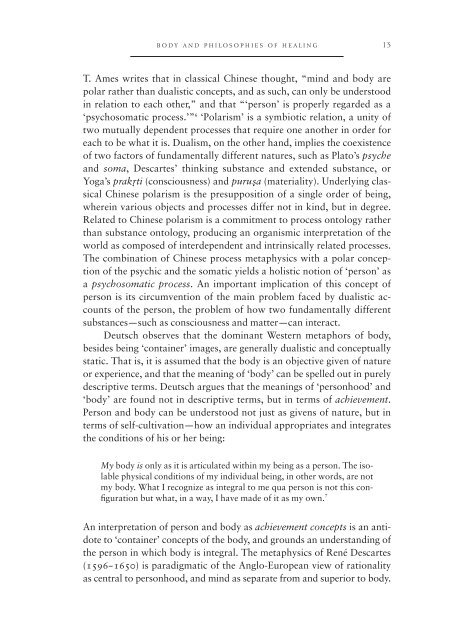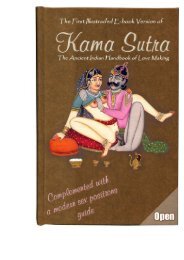body and health in yoga, Ayurveda, and Tantra
body and health in yoga, Ayurveda, and Tantra
body and health in yoga, Ayurveda, and Tantra
You also want an ePaper? Increase the reach of your titles
YUMPU automatically turns print PDFs into web optimized ePapers that Google loves.
ody <strong>and</strong> philosophies of heal<strong>in</strong>g 13<br />
T. Ames writes that <strong>in</strong> classical Ch<strong>in</strong>ese thought, “m<strong>in</strong>d <strong>and</strong> <strong>body</strong> are<br />
polar rather than dualistic concepts, <strong>and</strong> as such, can only be understood<br />
<strong>in</strong> relation to each other,” <strong>and</strong> that “‘person’ is properly regarded as a<br />
‘psychosomatic process.’” 6 ‘Polarism’ is a symbiotic relation, a unity of<br />
two mutually dependent processes that require one another <strong>in</strong> order for<br />
each to be what it is. Dualism, on the other h<strong>and</strong>, implies the coexistence<br />
of two factors of fundamentally different natures, such as Plato’s psyche<br />
<strong>and</strong> soma, Descartes’ th<strong>in</strong>k<strong>in</strong>g substance <strong>and</strong> extended substance, or<br />
Yoga’s prakÓrti (consciousness) <strong>and</strong> puruÓsa (materiality). Underly<strong>in</strong>g classical<br />
Ch<strong>in</strong>ese polarism is the presupposition of a s<strong>in</strong>gle order of be<strong>in</strong>g,<br />
where<strong>in</strong> various objects <strong>and</strong> processes differ not <strong>in</strong> k<strong>in</strong>d, but <strong>in</strong> degree.<br />
Related to Ch<strong>in</strong>ese polarism is a commitment to process ontology rather<br />
than substance ontology, produc<strong>in</strong>g an organismic <strong>in</strong>terpretation of the<br />
world as composed of <strong>in</strong>terdependent <strong>and</strong> <strong>in</strong>tr<strong>in</strong>sically related processes.<br />
The comb<strong>in</strong>ation of Ch<strong>in</strong>ese process metaphysics with a polar conception<br />
of the psychic <strong>and</strong> the somatic yields a holistic notion of ‘person’ as<br />
a psychosomatic process. An important implication of this concept of<br />
person is its circumvention of the ma<strong>in</strong> problem faced by dualistic accounts<br />
of the person, the problem of how two fundamentally different<br />
substances—such as consciousness <strong>and</strong> matter—can <strong>in</strong>teract.<br />
Deutsch observes that the dom<strong>in</strong>ant Western metaphors of <strong>body</strong>,<br />
besides be<strong>in</strong>g ‘conta<strong>in</strong>er’ images, are generally dualistic <strong>and</strong> conceptually<br />
static. That is, it is assumed that the <strong>body</strong> is an objective given of nature<br />
or experience, <strong>and</strong> that the mean<strong>in</strong>g of ‘<strong>body</strong>’ can be spelled out <strong>in</strong> purely<br />
descriptive terms. Deutsch argues that the mean<strong>in</strong>gs of ‘personhood’ <strong>and</strong><br />
‘<strong>body</strong>’ are found not <strong>in</strong> descriptive terms, but <strong>in</strong> terms of achievement.<br />
Person <strong>and</strong> <strong>body</strong> can be understood not just as givens of nature, but <strong>in</strong><br />
terms of self-cultivation—how an <strong>in</strong>dividual appropriates <strong>and</strong> <strong>in</strong>tegrates<br />
the conditions of his or her be<strong>in</strong>g:<br />
My <strong>body</strong> is only as it is articulated with<strong>in</strong> my be<strong>in</strong>g as a person. The isolable<br />
physical conditions of my <strong>in</strong>dividual be<strong>in</strong>g, <strong>in</strong> other words, are not<br />
my <strong>body</strong>. What I recognize as <strong>in</strong>tegral to me qua person is not this configuration<br />
but what, <strong>in</strong> a way, I have made of it as my own. 7<br />
An <strong>in</strong>terpretation of person <strong>and</strong> <strong>body</strong> as achievement concepts is an antidote<br />
to ‘conta<strong>in</strong>er’ concepts of the <strong>body</strong>, <strong>and</strong> grounds an underst<strong>and</strong><strong>in</strong>g of<br />
the person <strong>in</strong> which <strong>body</strong> is <strong>in</strong>tegral. The metaphysics of René Descartes<br />
(1596–1650) is paradigmatic of the Anglo-European view of rationality<br />
as central to personhood, <strong>and</strong> m<strong>in</strong>d as separate from <strong>and</strong> superior to <strong>body</strong>.



